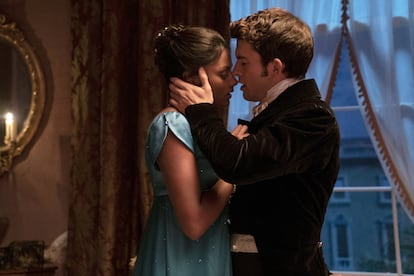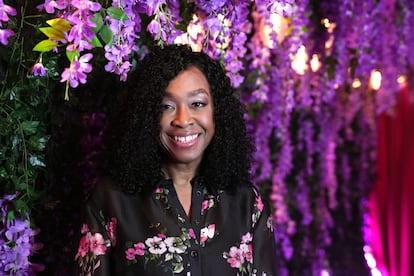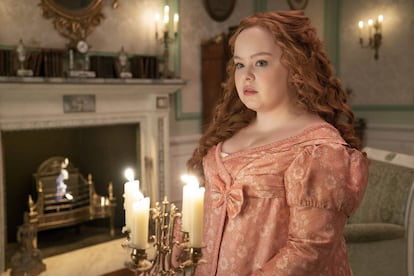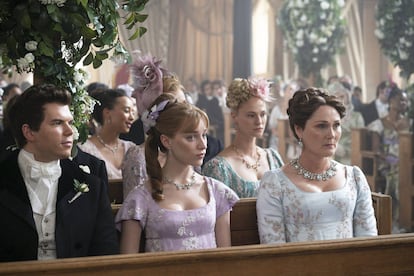Shonda Rhimes on the sex scenes in ‘Bridgerton’: ‘We’re not trying to take advantage of anyone’s body’
The high-paid showrunner is celebrating two decades as the undisputed queen of creating TV series, with the premiere of the third season of ‘Bridgerton’ on Netflix

Julie Andrews once said that Shonda Rhimes “changed the face of television.” And, as cliché as it may sound, the legendary actress from The Sound of Music and Mary Poppins was won over by the catalog of stories starring characters of all ethnicities, skin colors, creeds, sexual orientations and gender identities that emerged from the imagination of a woman from Chicago.
Their paths crossed just 20 years ago, when Andrews starred in the sequel to the successful The Princess Diaries, with a script written by an unknown thirty-something named Shonda Rhimes. It didn’t take long for that young woman to make a name for herself as the most powerful force in the television industry: Grey’s Anatomy, Scandal and How to Get Away with Murder placed her on the throne of the global media kingdom. With more than 70 episodes a year broadcast under her supervision, she became — by her own admission — the “highest-paid” showrunner on TV. But, in 2017, she decided to change things up.
“I honestly have to admit that, for a long time, I suffered from big time exhaustion,” Rhimes explains to EL PAÍS via video call. At the peak of her success — and while rejecting equally or more lucrative offers — she signed a multimillion-dollar contract with Netflix. She sought — in her own words — to counteract the exhausting nature of her schedule and revive her passion for the profession. “I couldn’t find the time to be able to dedicate myself to stories. Thanks to the streaming model, I can have more creative thinking,” she explains.
The change didn’t take long to bear fruit. Her first series for the platform — Bridgerton — became the company’s biggest success to date. A period piece that has just released its third season, it’s expected to continue to break records.

Julie Andrews serves as narrator in the series. And it’s precisely her fictional alter-ego who will be the main voice of the latest batch of episodes, which saw the first part begin streaming on May 16, with the second portion set to premiere on June 13. Meanwhile, actress Nicola Coughlan reprises the character of Penelope Featherington, one of the fans’ favorites. Her popularity stems from her ability to frighten the upper classes of London in the early-1800s, with her signed pamphlets under the pseudonym of Lady Whistledown.
In season three, the young woman will embark on the search for a husband with the help of her childhood friend, Colin Bridgerton (played by Luke Newton). She will also have to decide if his love advice is of a purely friendly nature. Upon being placed at the center of the new installment of the highly-popular series, Coughlan had to take to social media to request an end to negative comments about her weight and appearance.
“Nicola is beautiful,” the creator of the series affirms. “She’s fantastic just the way she is and we love having the opportunity to celebrate both her and her character. We always knew we were going to tell the story of Colin and Penelope.”
Will putting the spotlight on Nicola encourage other women to finally feel like they’re the protagonists of their own stories? “I feel like we all are,” she replies. “There are thousands of examples of beautiful women of all sizes living their lives to the fullest. Thinking that these women aren’t attractive is a strange stereotype, because there are many men who feel that they are.”

The new season, once again, features a good number of fiery intimate scenes, which have already become one of the most distinctive characteristics of a fictional series that — according to its chief executive — has made the exploration of female desire its principal objective. In an industry that has seen explicit moments of sex or nudity diminish by leaps and bounds over the past couple of decades, Bridgerton stands out as a rare bird that combines the support of the audience and the blessing of the actors involved in these scenes.
When asked about the reasons for becoming an exception to the prevailing rule, Rhimes assures EL PAÍS that she plans each scene as if it were an action sequence. “This is a job — a literal job — not someone hooking up with a random guy. We want everyone to feel safe and comfortable. We don’t try to take advantage of anyone’s body and we have an intimacy coordinator on set who helps us plan everything,” she details. This conviction has accompanied her since her beginnings as a producer. “I remember telling the actresses of Grey’s Anatomy, ‘If you want to film a sex scene with a snowsuit on, go for it. We’ll figure it out.’”
Empire-style dresses, tiaras, corsets, gloves, pearl-and-feather headdresses... another effect that the series has had since its premiere has been to revolutionize the wardrobes of its viewers. Online searches for clothing related to the early-1800s skyrocket with the premiere of each new season. Fashion magazines from around the world have joined the trend, proposing looks inspired by the series. Yet, these modified outfits are perfectly suitable to be worn in 2024.
“We’ve always wanted people to feel that fashion is another character. We pay a lot of attention to it,” Rhimes notes. However, she does acknowledge her astonishment at the rise of this style on the streets and on the catwalks, a trend that has been coined as “Regencycore,” in reference to the British era that the series is set in. “It’s always surprising when something takes off so much… but when they first showed me the styles and fabrics, it was really spectacular. I wanted to wear it myself. And, if I thought that, I was sure that other women would, too.”
Before ending her video interview with EL PAÍS and admitting other journalists from the virtual waiting room, Shonda Rhimes briefly takes stock of her 20-year-long incontestable reign in the television industry. “I think what I’m most proud of is the opportunities we’ve created. We took a lot of people out of the writing rooms, gave them their own series and helped them advance in the industry. I love that.”
She concludes by giving three pieces of advice for those who are standing in front of the blank page and want to follow in her footsteps: “Don’t try to imitate anyone — find your own style and be original. Never walk into a room thinking you don’t deserve to be there. And don’t give up: if you really want to be a screenwriter, never give up.”

Sign up for our weekly newsletter to get more English-language news coverage from EL PAÍS USA Edition
Tu suscripción se está usando en otro dispositivo
¿Quieres añadir otro usuario a tu suscripción?
Si continúas leyendo en este dispositivo, no se podrá leer en el otro.
FlechaTu suscripción se está usando en otro dispositivo y solo puedes acceder a EL PAÍS desde un dispositivo a la vez.
Si quieres compartir tu cuenta, cambia tu suscripción a la modalidad Premium, así podrás añadir otro usuario. Cada uno accederá con su propia cuenta de email, lo que os permitirá personalizar vuestra experiencia en EL PAÍS.
¿Tienes una suscripción de empresa? Accede aquí para contratar más cuentas.
En el caso de no saber quién está usando tu cuenta, te recomendamos cambiar tu contraseña aquí.
Si decides continuar compartiendo tu cuenta, este mensaje se mostrará en tu dispositivo y en el de la otra persona que está usando tu cuenta de forma indefinida, afectando a tu experiencia de lectura. Puedes consultar aquí los términos y condiciones de la suscripción digital.









































